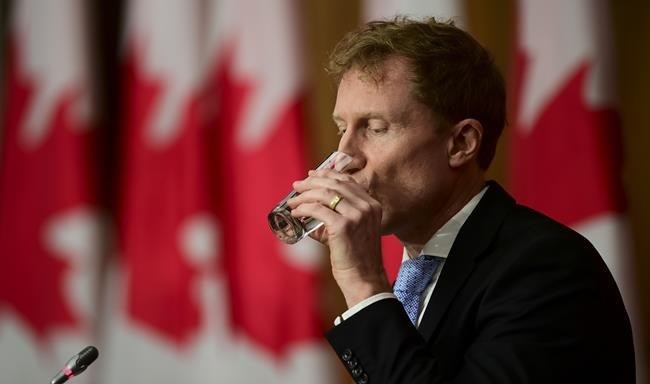OTTAWA — The federal government says it will not meet a marquee pledge by Prime Minister Justin Trudeau to lift all boil-water advisories in First Nations communities by March 2021.
Indigenous Services Canada says at least 22 long-term water advisories in 10 First Nations communities will remain in place beyond that deadline, which was set following an ambitious 2015 Liberal election promise to lift them all within five years.
"What communities want is not an Ottawa-imposed deadline," Indigenous Services Minister Marc Miller said Wednesday during a news conference in Ottawa.
"It’s a long-term commitment to access to clean water."
The COVID-19 pandemic has thrown a wrench into efforts to upgrade water systems and carry out on-site training, with supply chains snarled and construction put off as some reserves opted to restrict travel, the department said at an earlier briefing.
"COVID has really changed everything," Miller said. “Because of COVID, many projects lost a full construction season."
The complexity of projects, which can include infrastructure overhauls and depend on increasingly unreliable winter roads, contributed to the delay even before the pandemic, he said. Hiring and retaining qualified operators for water and wastewater treatment plants on remote sites has posed another challenge.
Miller, who has held the Indigenous services portfolio since November 2019, sought to shield Trudeau from blame for the failed goal.
"Ultimately, I bear the responsibility for this, and I have the responsibility and the duty to get this done," he said, calling the continued lack of access to reliable drinking water "totally unacceptable."
The department says 97 boil-water advisories have been lifted since 2016, while 59 remain in place — about three-quarters of them in Ontario — in 41 communities.
In late October, about 250 residents of Neskantaga First Nation in northern Ontario, which has had a boil-water advisory in place for 25 years, were evacuated from their homes following the discovery of an oily sheen in its reservoir.
Assembly of First Nations National Chief Perry Bellegarde said Wednesday he was frustrated but not surprised by Ottawa's shortfall.
"First Nations have good reason to be disappointed by the federal government’s announcement that after more than five years in office, it will miss its own target to provide safe drinking water to all Indigenous communities across Canada," he said in a statement.
"While there has been significant progress in recent years, it clearly is not enough."
Miller acknowledged that initially, communities were not “sounded” out on whether the March 2021 target was reasonable.
He said he hopes up to 20 more advisories will be lifted by year's end, but expects at least a dozen communities will still not have access to potable water by the spring.
"You come down to about 12 or a few more communities, some of whom have seen serious delays due to COVID — and they’re working hard to clear them — and others that have priorities that they want addressed before they lift their water advisories," he said, noting that communities make the call on whether to lift advisories, not Ottawa.
"I think we didn’t appreciate the state of decay of water systems when we came into power in 2015," he added, pointing to "decades of neglect."
Opposition parties slammed the federal government for falling short of its goal.
"We weren't totally surprised by this, but at the same time, there's a pretty significant disappointment in it being actually acknowledged and outright spoken ... by the minister today," Conservative MP Gary Vidal, his party's critic for Indigenous services, said in an interview.
In a separate statement, Vidal called for a more commercially driven approach that draws on the "brightest business minds and entrepreneurs" to get taps flowing safely.
NDP Leader Jagmeet Singh called the problem "disgusting" and "inexcusable."
"Imagine Minister Miller going to his riding in Montreal: 'I apologize, but we missed our deadline to get you clean drinking water.' Would he ever think it was appropriate?" Singh asked at a news conference.
“This is not a broken promise. This is a betrayal of trust, and it sends a message that Indigenous people don't matter."
In its fall economic statement Monday, the Liberal government pledged to invest $1.5 billion this year to work toward lifting all long-term drinking water advisories in Indigenous communities, on top of $2.1 billion already committed since 2016.
More than $1.65 billion of that has already flowed to 626 water and wastewater projects, including 348 that are now completed, according to Indigenous Services.
The beefed-up funding reflects a long-term commitment, particularly to operations and maintenance, so that communities can continue to tap into clean water indefinitely, Miller said.
Under current funding policies for operations and maintenance on reserves, Ottawa typically provides about 80 per cent of the cash while First Nations have to float the remaining 20 per cent.
Miller said Indigenous Services is still hammering out a policy adjustment, "but my full expectation is that will move to 100 per cent."
This report by The Canadian Press was first published Dec. 2, 2020.
— with files from Maan Alhmidi
Christopher Reynolds, The Canadian Press



